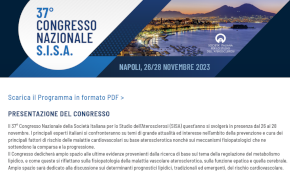 Rivista in lingua italiana
Rivista in lingua italiana
riservata ai Soci SISA
Ultimo numero:
Anno 14 • N.4/2023
Abstract
The SLCO1B1*5 genetic variant is associated with statin-induced side effects
Voora D, Shah SH, Spasojevic I, Ali S, Reed CR, Salisbury BA, Ginsburg GS.
J Am Coll Cardiol 2009;54:1609-16
OBJECTIVES: We sought to identify single nucleotide polymorphisms associated with mild statin-induced side effects. BACKGROUND: Statin-induced side effects can interfere with therapy. Single nucleotide polymorphisms in cytochrome P450 enzymes impair statin metabolism; the reduced function SLCO1B1*5 allele impairs statin clearance and is associated with simvastatin-induced myopathy with creatine kinase (CK) elevation. METHODS: The STRENGTH (Statin Response Examined by Genetic Haplotype Markers) study was a pharmacogenetics study of statin efficacy and safety. Subjects (n = 509) were randomized to atorvastatin 10 mg, simvastatin 20 mg, or pravastatin 10 mg followed by 80 mg, 80 mg, and 40 mg, respectively. We defined a composite adverse event (CAE) as discontinuation for any side effect, myalgia, or CK >3x upper limit of normal during follow-up. We sequenced CYP2D6, CYP2C8, CYP2C9, CYP3A4, and SLCO1B1 and tested 7 reduced function alleles for association with the CAE. RESULTS: The CAE occurred in 99 subjects (54 discontinuations, 49 myalgias, and 9 CK elevations). Sex was associated with CAE (percent female in CAE vs. no CAE groups, 66% vs. 50%, p < 0.01). SLCO1B1*5 was associated with CAE (percent with > or = 1 allele in CAE vs. no CAE groups, 37% vs. 25%, p = 0.03) and those with CAE with no significant CK elevation (p < or = 0.03). Furthermore, there was evidence for a gene-dose effect (percent with CAE in those with 0, 1, or 2 alleles: 19%, 27%, and 50%, trend p = 0.01). Finally, the CAE risk appeared to be greatest in those carriers assigned to simvastatin. CONCLUSIONS: SLCO1B1*5 genotype and female sex were associated mild statin-induced side effects. These findings expand the results of a recent genome-wide association study of statin myopathy with CK >3x normal to milder, statin-induced, muscle side effects.
J Am Coll Cardiol 2009;54:1609-16

Area Soci
Eventi



 SISA LIPID ACADEMY - Corso avanzato di lipidologia clinica
SISA LIPID ACADEMY - Corso avanzato di lipidologia clinicaModena, 22-23 Giugno 2023
[continua a leggere]Giornale Italiano Arteriosclerosi
HoFH today
 Rivista Italiana della
Rivista Italiana della
Ipercolesterolemia
Familiare Omozigote
Anno 5 • N.1/2023
Rivista NMCD
Diateca
[continua a leggere]
[continua a leggere]
Newsletter
il vostro indirizzo di posta elettronica
Progetto LIPIGEN

Nuovo sito dedicato al Progetto LIPIGEN
Progetto LIPIGEN - Vecchio portale
E' necessario essere loggati come utente
Lipigen per poter accedere alla pagina
PROject Statin Intolerance SISA
PROSISA – PROject Statin Intolerance SISA
E' necessario essere loggati come utente
PROSISA per poter accedere alla pagina
GILA - Lipoprotein Aferesi
Gruppo Interdisciplinare Lipoprotein Aferesi
(Accesso Gruppo GILA-Lipoprotein Aferesi)
E' necessario essere loggati come utente del Gruppo GILA per poter accedere
Gruppo Interdisciplinare Lipoprotein Aferesi
(Documentazione ad accesso libero)
Pagina informativa per medici e pazienti








